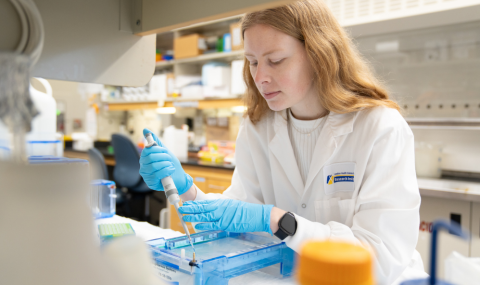About Palliative Radiotherapy
- Palliative radiotherapy (PRT) is a quick, effective means of relieving symptoms and improving quality of life for patients with advanced, incurable cancer.
- PRT is delivered in short treatment courses, ranging from a single treatment to 1-2 weeks of treatment.
- Maximal PRT treatment response usually occurs 2-4 weeks after treatment is completed, and some patients may experience a temporary worsening of symptoms before improvement.
- For patients in the final weeks of life with controlled symptoms, best-supportive palliative
care may be a more appropriate option.
About the Verspeeten Family Cancer Centre
Verspeeten Family Cancer Centre provides service for patients admitted to regional hospitals who have cancer-related symptoms and could benefit from quick access to radiation therapy. In most cases, patients are seen within one (1) week of referral and can be treated on the same day as their consultation appointment, which is ideal for inpatients traveling from a distance.
About the Treatment Pathway
Patients will be consulted by our Radiation Oncology team and then undergo a CT simulation scan for treatment planning purposes. Both of these appointments usually take about 30-45 minutes, but there may be some waiting time in between.
After CT simulation, our team will create and perform quality assurance on a treatment plan, a process which takes several hours. During this time, we can accommodate patients in our Stretcher Bay area. Though support staff and physicians are available on site, patients will often be unattended during this waiting period.
Once the plan is ready, treatment will be delivered. This usually takes about 20-30 minutes.
If the patient will receive more than one treatment, they will be provided with a schedule for their remaining appointments. The home hospital is responsible for booking all transportation for subsequent treatments.
Important Information
If it is unsafe for your patient to remain unattended, or if they have complex care needs or require assistance with medications, toileting, eating, etc., they MUST be accompanied by a member of your Care Team.
Patients (and any accompanying member of their Care Team) should expect to spend at least 5-6 hours at Verspeeten Family Cancer Centre for the first PRT appointment.
On rare occasions, transfer to LHSC as an inpatient for duration of treatment may be appropriate. In these cases, transfer must be arranged in advance by the home hospital MRP and the treating Radiation Oncologist as bed availability is extremely limited.
How to Prepare Your Patient
All inpatients should be sent with an information package which includes:
- A flag for any precautions, i.e. contact, droplet, etc.
- A complete medication reconciliation list.
- A copy of any resuscitation status order, if applicable.
- Relevant care notes/results of recent investigations.
- Transport instructions or arrangements, including booking confirmation numbers.
- Contact information for the home hospital MRP/Care Team.
Ensure the patient has everything that they will need throughout the day. This includes:
- Any and all medications they will require. If a patient is in pain, it is imperative that they bring their analgesia in a format they can self-administer, or which can be administered by the accompanying member of your Care Team. For patients with pain pumps, home hospitals should ensure adequate supply for a minimum of 12 hours.
- Any required assistive devices and/or ostomy/incontinence supplies, etc.
- A meal, snacks and/or nutritional supplements.
- Cell phone and charger (if they wish to remain in contact with family/friends)
Ensure that patients who are in pain receive the necessary analgesia to make their transport more
tolerable.
Transportation
- It is common to experience delays with patient transport services.
- If transportation from the home hospital to Verspeeten Family Cancer Centre is delayed, please advise us as soon as possible
by calling 519-685-8610. - End-of-day transport availability is often limited and results in delays or pick-ups times after the
regular operating hours of Verspeeten Family Cancer Centre. Nursing support is unavailable after 6:00 pm. Patients with
after-hours pick-ups will be attended, but supports are limited and in some cases patients may
be transferred to another area of the hospital while waiting for transportation.
Managing side effects
- Side effects are dependent upon the area being treated and the organ(s)/tissue(s) which receive a substantial dose; side effects are temporary and usually mild.
- The most common side effect of PRT, experienced by 2/3 of patients, is fatigue.
- Acute effects usually resolve within 4-6 weeks of completing treatment, and long-term effects
are uncommon. - Increased analgesia, anti-emetics, and/or corticosteroids may be prescribed to reduce
discomfort and side effects during and/or after treatment. - All patients will receive written information about their treatment area(s), possible acute
reactions, and side effect management.
Follow-up
Patients are most often discharged back to the care of their regional hospital, but in some cases the
Verspeeten Family Cancer Centre team may recommend or coordinate future follow-up or investigations.
Contacting the Palliative Radiotherapy Team
If you have any questions or would like more information, please contact Melissa O’Neil (Palliative
Care Clinical Specialist Radiation Therapist) at 519-685-8500, extension 75337, or Radiation
Reception at 519-685-8610.


